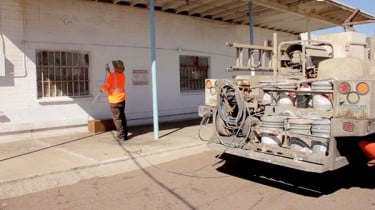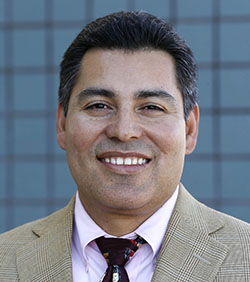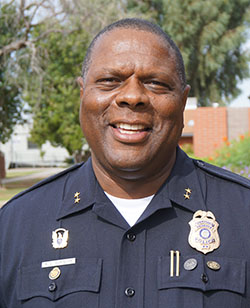By Laurie Merrill
GCU News Bureau
Parents pushing strollers. Early morning joggers. Homeowners tending their yards. Students eager for school.
These are some of the changes taking place in the west Phoenix neighborhood surrounding Grand Canyon University. Thanks in part to GCU’s 3-year-old Neighborhood Safety Initiative, crime prevention in the Canyon Corridor, an area between Interstate 17 and 43rd Avenue and from Bethany Home to Indian School roads, is gaining momentum.
Those scenes are anecdotal evidence the initiative is working. FBI crime figures offer further statistical proof. Violent crime decreased 24 percent and property crimes dipped 20 percent during the first six months of 2015 compared to last year. To put that in some context, during the same period, violent crime across Phoenix rose 7 percent and property crime decreased slightly, by 3 percent, according to the FBI's Uniform Crime Reports.
The crime drop in the Canyon Corridor coincides with the launch of a collaboration between the University and the city.
“Every single crime area in our community is down … and some are down as much as 50 percent,” said GCU President/CEO Brian Mueller. “Our campus is a very safe place for students. With this initiative, our goal is to make the surrounding community as safe as possible for our neighbors, hopefully attract new businesses to the area and restore this area to the middle-class neighborhood it had been.”
The impact on crime
The Neighborhood Safety Initiative started in 2012, when GCU and the Phoenix Police Department announced a unique partnership to reduce crime and build a stronger neighborhood around the University. GCU and Phoenix each pledged to donate $100,000 a year to the Cactus Park Precinct for five years ending in 2017, adding $1 million to fight crime.
“That singular partnership has had more to do with the downward trend in crime than anything else,” said Cmdr. Kevin Robinson of the Cactus Park Precinct.
The funding allows the precinct to assign additional police to trouble spots and to clean up dangerous areas, said Kenneth Laird, associate director of GCU's Department of Public Safety. It provides at least 58 additional hours of overtime a week so that officers in the precinct can saturate the neighborhood and remove buildings where criminals hide or live.
“We saturated this area,” said Laird, a police veteran with more than 20 years of experience who previously worked in the Cactus Park Precinct. “The police are doing excellent work.”
GCU also has improved safety by buying and tearing down high-crime properties while expanding the campus. Quatros Condominiums, once a haven for crime activity, used to occupy land where the University recently opened The Grove, a community of four residence halls for freshmen. The Public Safety Department is housed next door in the Grove parking garage.
A safer place for area students
Crime reports are not the only measure of success. At Alhambra High School, less than a mile west of GCU, there have been corresponding increases in graduation rates, standardized test scores, grades and the size of the student body.
“It’s been a massive transformation,” Alhambra principal Claudio Coria said. “There is a level of (police) visibility that sends the message, ‘This is a safe place.’”
Before the Neighborhood Safety Initiative was launched, crime was the biggest concern cited by Alhambra parents. Students reported being harassed, groped and robbed on their way to and from school, Coria said.
Thieves lay in wait for students before arrival and after dismissal, he said. Some drove alongside students, stole their cell phones and computers, and sped away. Aggressive panhandlers demanded money. Dealers sold drugs.
But since the formation of the crime-fighting partnership, Coria has pointed police to specific corners and parking lots that he called “hot spots,” places where adults not associated with the school at times had loitered and bothered students.
“Police cleared them out,” Coria said.
Student population at Alhambra has grown from 2,640 in the 2011-12 school year to 2,883 this year, Coria said, attributing the influx not only to the initiative but also to other partnerships with GCU, such as free tutoring, summer science, technology, engineering and math (STEM) classes and a program that enables Alhambra students to earn college credits for free.
“Our levels of learning are helped by the level of safety,” Coria said. “GCU has helped us to be a better place.”
The streets around GCU are becoming friendlier, too, police noted.
“When you make a community attractive, people want to be part of that,” Robinson said. “That’s what we are seeing around GCU.”
Contact Laurie Merrill at (602) 639-6511 or [email protected].











































